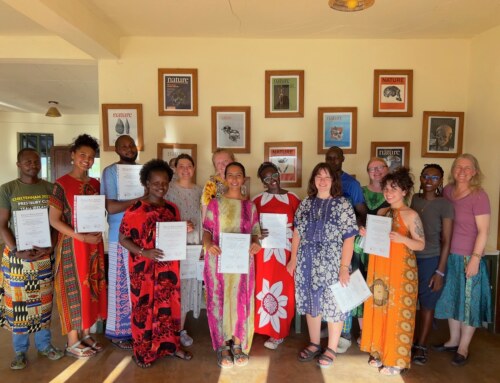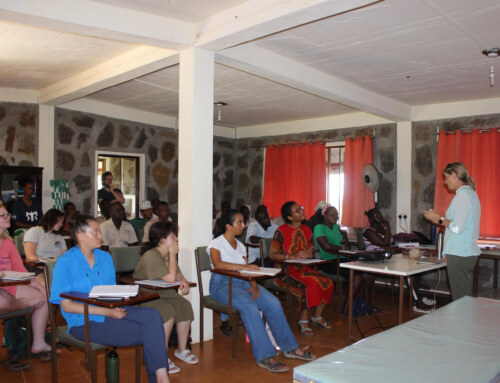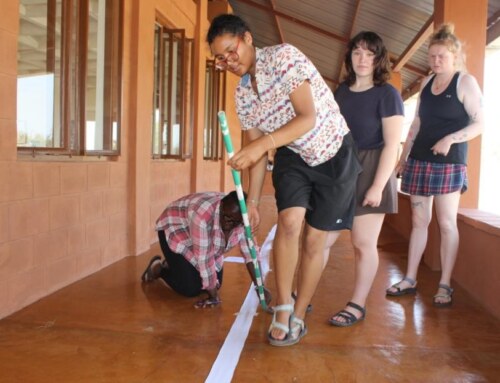Hello readers of the TBI Origins Field School blog, providing updates and a recap of this past week are students Maddie, an undergraduate at Stony Brook University, and David, a postgraduate student at Kenyatta University! After a relaxing Sunday at Ileret spent playing football alongside the locals at the nearby village, and some sodas to top off the weekend, we were ready to begin the second week of vertebrate paleontology with Dr Miller!

Maddie and David working as partners during the course.
We all crowded into the lorry bright and early on Monday morning to make our way about 2.5 hours northeast of TBI where the staff and professors had planned a fun 3 nights of camping at a fossil locality known as Buluk. Our professor of paleontology, Dr. Ellen Miller, has been working at this site for nearly two decades. She explained that this location is one of the most remote fossil localities in the world. With only a handful of other researchers and field school students having been there before, we were all very excited! We arrived late in the morning and helped the TBI staff set up the campsite (though a few of us felt like the most help we could give was stepping out of the way!). With the help of the amazing TBI team, we quickly had a campsite full of tents, as well as an outdoor kitchen, a “bathroom,” and a shower! As Dr Ellen said, “Welcome to my world!”

Simone, Alisa, and Charles excited about the upcoming adventure
With our campsite at the center of the Buluk locality, we were conveniently within walking distance of every field site and fossil-bearing spot on our itinerary. In the afternoon we had our first hands-on experience with paleontological fieldwork at a site called Dead Elephant’s Valley, where our goal was to become familiar with identifying fossil bones and teeth outside of the classroom. The students and staff found a wide assortment of crocodile teeth and cranial bones, pieces of tusk, and many elephant fossil remains! After a couple of short sightseeing stops that included a view over the valley and a fossilized tree from which a young, living tree was sprouting, we returned to camp and, after a delicious dinner courtesy of Head Chef Edwin, we turned in for the night.
The following morning was another early rise, and we were headed to the fossil site at 7 am to get ahead of the desert heat for our “hill crawl” for fossils. Upon arrival, we spread out in a line at the base of a relatively flat hill and began searching for fossils with our eyes close to the ground to not miss anything important like small fossilized teeth or small primate bones. By lunch break, the group had collectively found a number of amazing specimens including a complete monkey molar, a small primate metapodial, part of a monkey tibia, and many more! We headed back to camp with plans to return to catalog the remaining fossils in the afternoon, excited to continue with our work at the site. However, Mother Nature had different plans for us!
As we prepared to trek back to our flagged fossils, bellies full from lunch and water bottles filled, an abrupt downpour and heavy winds drove the students and staff for the cover of the vehicles; we soon found our tents and personal items soaked from the unexpected weather. We didn’t let the events of the afternoon get to us; after hanging our things out to dry and rearranging the tents where necessary, we spent the rest of the day relaxing and playing games together, as well as celebrating the 21st birthday of Alisa, one of our fellow students and our now close friend, with a nice fire and chocolate cake prepared at the camp by amazing chef Edwin and his fantastic team!
After this unexpected turn of events, we all woke up on Wednesday morning not knowing what the day would hold. After breakfast, it was soon decided that it was still too wet and rainy for us to go back into the field to continue with our fossil finds from the previous day, so the students spent the morning playing charades and walking along the newly filled lagga – the word used in East Africa for a (usually!) dry river bed.

Students relaxing before their departure back to TBI
The decision was made to head back to TBI a day early, however, the issue remained that the lorries would be unable to get back to the main road through the wet sand. The students and a handful of the staff returned to the TBI-Ileret station in a Land Cruiser, with TBI trucks meeting us halfway. We did all have to walk for about an hour across a muddy field “Uwanja wa Ngano”; but once we arrived at the trucks, we began the lengthy but cozy ☺ sunset drive back to the comfort of Ileret camp. Home sweet home!
On Thursday morning, after a restful night back in our warm, mosquito-netted-beds, we started a relatively easy morning of lab work; half of us worked with microscopes to find and retrieve tiny fossils and bones mixed in sediment, while the other half of the students spent time carefully cleaning mammal fossils of dirt and debris with a small drill. The afternoon was reserved for study time in preparation for our upcoming final exam and osteology test on Saturday morning, which offered a preview for our Friday activities. Thursday and Friday proved to be very relaxing and uneventful in comparison to the previous few days at Buluk, so we all appreciated the ability to focus calmly for our exam. Many of us spent Friday working on our study questions provided by Dr. Miller, working out the best way to answer whatever would potentially appear on the written part of the exam, as well as playing with the animal bones to prepare for our timed osteology test.





